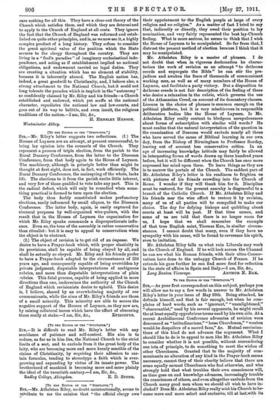[To THE EDITOR OP THE " SPECTATOR." J
Sra,—Mr. Riley's letter suggests two reflections. (1.) The Houses of Laymen are an attempt, at present unsuccessful, to bring lay opinion into the counsels of the Church. They represent a process of triple election, from the parish to the Rural Deanery Conference, from the latter to the Diocesan Conference, from that body again to the House of Laymen. The machinery, although in principle better than might be thought at first sight, does not, in fact, work efficiently. The Rural Deanery Conference, the mainspring of the whole, lacks life. The elections to it from the parish excite little interest, and very few of those qualified to vote take any part. This is the radical defect, which will only be remedied when some- thing practical is formed to turn upon the election.
The body thus feebly constituted makes perfunctory elections, easily influenced by small cliques, to the Diocesan Conference. The latter body, again, is easily captured for electoral purposes by well-organized wire-pullers, with the result that in the Houses of Laymen the organization for which Mr. Riley speaks commands a disproportionate influ- ence. Even so, the tone of the assembly is rather conservative than ritualist : but it is easy to appeal to conservatism when the object is to obstruct.
(2.) The object of revision is to get rid of an impasse. We desire to have a Prayer-book which, with proper elasticity in its provisions, shall be capable of being obeyed by all, and shall be actually so obeyed. Mr. Riley and his friends prefer to have a Prayer-book adapted to the circumstances of 250 years ago, and consequently capable of being overridden by private judgment, disputable interpretations of ambiguous rubrics, and more than disputable interpretations of plain mbrics. This fatal process, capable of being applied in more directions than one, undermines the authority of the Church of England which revisionists desire to uphold. This desire is, I believe, shared by an overwhelming majority of our communicants, while the aims of Mr. Riley's friends are those of a small minority. This minority are able to secure the negative support of the Houses of Laymen, as they now are, by raising collateral issues which have the effect of obscuring
those really at stake.—I am, Sir, &c., EPISCOPITS.










































 Previous page
Previous page